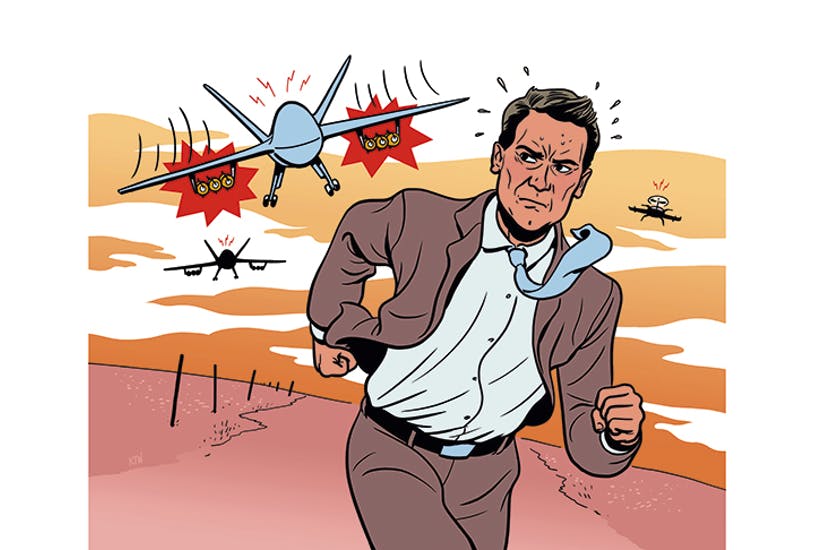Drones have come of age in the war on terror. When the United States and Britain invaded Afghanistan in 2001, the technology was barely out of the lab. Today, these flying machines represent a huge security threat. If reports are to be believed, a Houthi rebel-launched drone attack in Saudi Arabia last weekend shut down 5 per cent of the world’s global oil supply and caused the largest spike in the price of oil since the first Gulf War in 1990. This is what the future of warfare looks like.
So far, drones have been mostly on our side: used, very effectively, to disrupt and damage terrorist networks. The campaign against Al-Qaeda in Afghanistan and Pakistan that started in 2004 has been dubbed the Drone War. It’s estimated drones killed some 2,000 militants. But the technology moves on: drones are now accessible to anyone, from the Pentagon to rogue individuals. Wars in the 21st century will involve not just aircraft-sized drones built by defence manufacturers but smaller, cheaper devices operated remotely by a handful of attackers which can cause profound and significant disruption.
Britain got a taste last December, when reported drone sightings at Gatwick Airport caused chaos. It isn’t even clear whether the sightings were actually real. But the mere threat posed by a cheap consumer device, let alone one that was armed, was enough to paralyse one of the world’s busiest airports at the most critical time of year. The potential for greater disruption is pretty obvious: it just hasn’t happened yet.
Drones are essentially just flying computer systems, so they can be hacked using standard techniques
Terrorists have been using drones for some time. Isis has specialised in fitting 40mm grenades on to the underside of Chinese-made consumer drones, which can be flown in swarms against an enemy. An analysis by the Royal United Services Institute suggests that in 2017 Isis carried out 208 such strikes across Syria and Iraq, killing at least 130 Iraqi personnel.
In Syria, US forces have also encountered drones launched from Iran. Like the US, Iran now has drones that look like aircraft (such as the Shahed 129) and have significantly longer range than quadcopters (the sort of drones you might buy online). But you don’t have to be a sophisticated state actor to deploy this kind of drone. Syrian opposition forces have also been observed making airframes from plyboard and polystyrene, adding a petrol engine for propulsion, and then a GPS module for control taken from a consumer DIY kit.
The threat is everywhere. In January 2015, a DJI Phantom drone crash-landed on the South Lawn of the White House, perhaps the most secure building in the world. It did not appear to be a terrorist attack — but it did disturb defence analysts. The White House’s radar system had failed to detect the device.
Anti-drone technology is being hastily developed. The computer vision that is used to spot faces in photographs can also identify incoming drones. Products such as Dedrone’s DroneDNA take data from a variety of sensors, such as CCTV cameras, microphones and radio-frequency detectors to establish what type of drone might be incoming, thus giving operators a heads-up on how fast, how far and what sort of load a given drone may be carrying.
When it comes to neutralising drones, there are three approaches: jamming, hacking and what is euphemistically called the ‘kinetic’ approach. In addition to static jammers, portable jamming equipment already exists on the battlefield. Battelle’s DroneDefender looks a little like a rifle, but what it fires is radio waves, which work as jamming signals. According to the company, it is capable of knocking out the control signals sent by pilots to drones, as well as GPS signals, so the drone will not be able to follow a pre-set path.
A more sophisticated approach is to hack into the drones and take control of them directly. Drones are essentially just flying computer systems, so standard hacking techniques can be used, such as signal substitution, in which a hacker sends spoof control signals. This tricks the drone into thinking it is being controlled by the operator.
The ‘kinetic’ solution is more dramatic, using physical force to take drones out. The Saudis have American-made Patriot and Hawk missile systems, but neither would have been much use last weekend. The drones and missiles that struck Saudi Arabia seem to have flown fairly low to the ground, thus dodging detection systems. There are alternatives: defence contractor Rafael has a ‘Drone Dome’ defence system that uses lasers to lock on and shoot down rogue drones after they have been detected. A rival company called Airspace has pioneered a system that uses drones to take out other ones using nets. But this has limits. Defensive anti-drone technology has a lot of catching up to do.
For now, terrorists tend to prefer low-tech methods: driving trucks into people is easier than flying a drone. But drones already pose major security challenges, and the menace will only grow. The question is: can we develop the right answers in time?






Comments